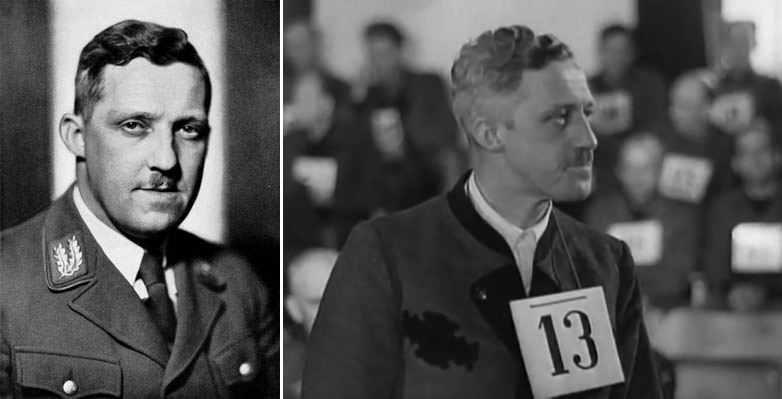History's Judgement: August Eigruber

Above: at left is August Eigruber as SS-Gruppenführer and Gauleiter of Oberdonau. At right he is defendant No. 13,
hearing the verdict and his death sentence at the American Military Tribunal at Dachau (84,986 bytes).
-
August Eigruber (b. 16 April 1907, d. 28 May 1947) became one of the most powerful Austrian men in the Nazi Party hierarchy. Eigruber was an associate of several top Nazis including Ernst Kaltenbrunner, Adolf Eichmann and Adolf Hitler, all of whom were born in Austria. He was also a friend of Martin Bormann, Hitler's deputy.
In the 1920's Eigruber was employed at the Steyr factory and the Reithoffer rubber plant before turning his interest onto politics. In April 1928 he joined the Nazi Party, whose interests he advanced in the Steyr-Land district council leadership post he took up in October 1930. He promoted the Nazi Party agenda, even serving time in an Austrian prison for his activities. After the Anschluss he was appointed Landeshauptmann on 14 March 1938. On 22 May 1938 he transferred from the SA to the SS as an SS-Standartenführer, a paramilitary rank considered the equivalent of an Oberst (Colonel). The next day, on 23 May 1938 he was appointed Landeshauptmann (Provincial Governor) of the Upper Austria. On 15 March 1940 Eigruber was appointed Gauleiter (imperial governor), the topmost Nazi Party representative in that region then known as Oberdonau, formerly and after the war known as Upper Austria.
In 1938 he helped to establish the Mauthausen complex by conveying the land to the SS and later by supporting their other projects, and aiding those efforts of industry including Steyr-Daimler-Puch. On 12 April 1940, he was sworn in as Reich Governor (Reichstatthalter) of Oberdonau. When Himmler visited KL Mauthausen-Gusen with Eigruber in April 1941, their photographs reveal Eigruber had been promoted to SS-Gruppenführer, the equivalent of Major General or a two-star General in the US Army. In November 1942 his successes led to his appointment as Reich Defence Commissar (Reichsverteidigungskommissar). On 21 June 1943, Eigruber was promoted to SS-Obergruppenführer, a rank equivalent to Lieutenant General as was Ernst Kaltenbrunner, and just below that of Himmler's special rank of Reichsführer SS. He also served on the Board of Directors of Steyr-Daimler-Puch AG.
Eigruber was captured on 10 August 1945 by American troops under Lieutenant Snowden near St. Pankraz, along the Austrian and Italian border. He was initially interviewed as a witness for the Nuremburg Trials, but then charged and tried by the American Military Tribunal at Dachau among sixty one other prisoners whose actions were related to Mauthausen camps and war crimes. He was convicted on 13 May 1946. Eigruber was particularly proud to represent the region of Austria where Adolf Hitler (born in Linz) was born, and he remained loyal to Hitler up to the moment of his hanging on 28 May 1947 at the Landsberg am Lech War Criminal Prison Nr. 1.